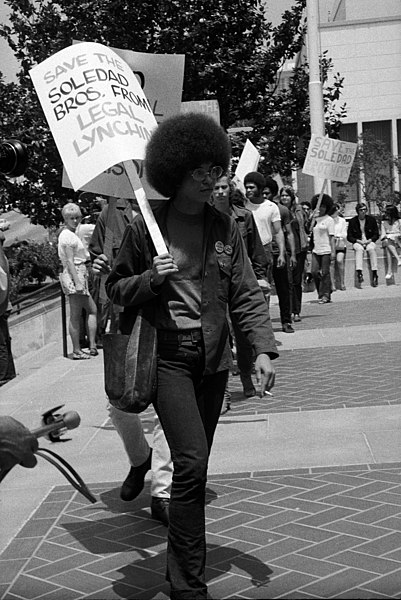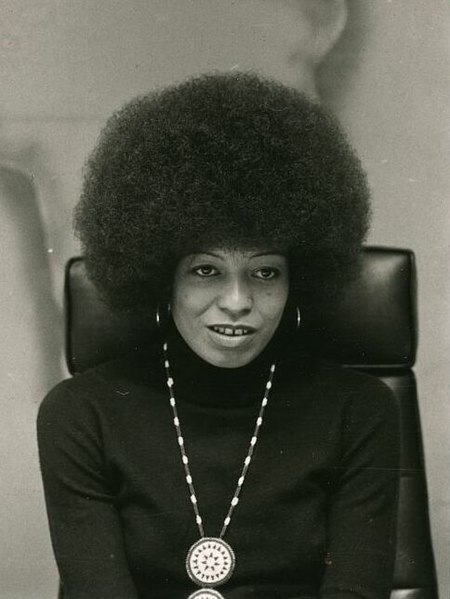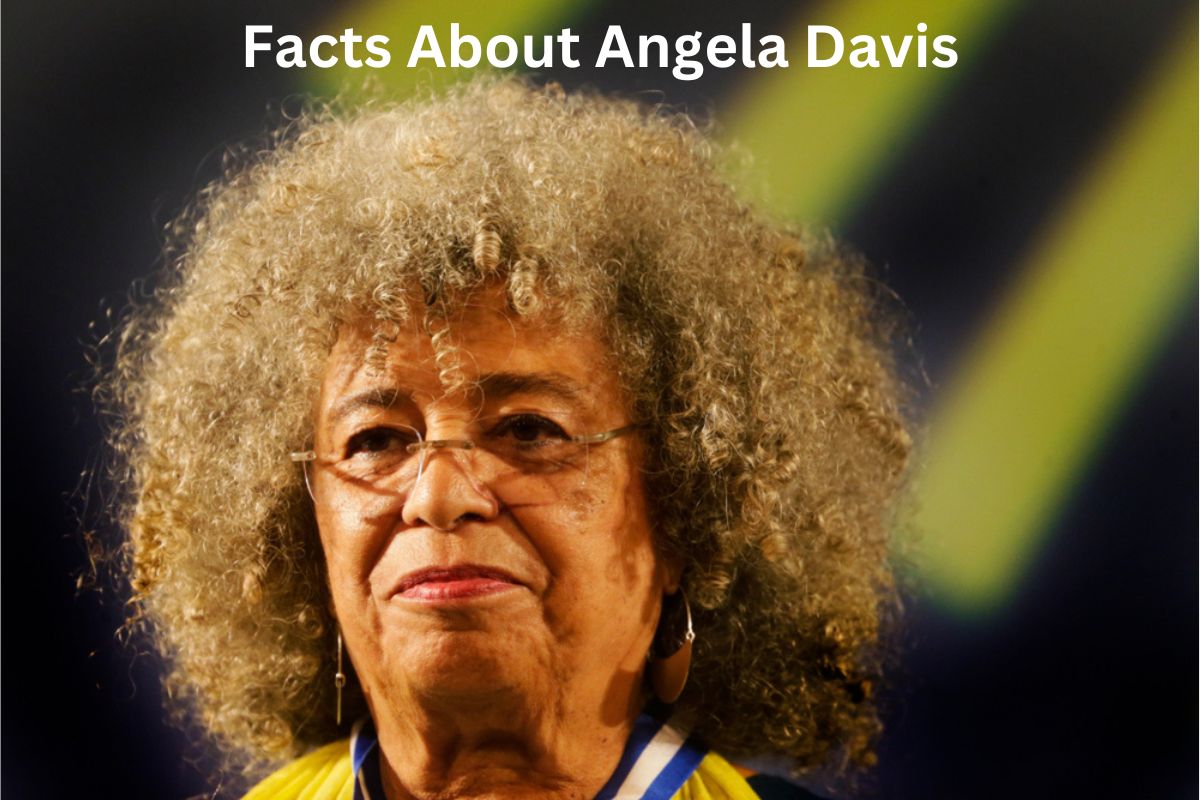Angela Davis is a prominent American political activist, scholar, and author. Born on January 26, 1944, in Birmingham, Alabama, she grew up in a racially segregated neighborhood, which shaped her understanding of systemic racism and fueled her passion for social justice.
Davis became actively involved in the Civil Rights Movement, advocating for racial equality and participating in protests and demonstrations. Her activism gained international attention in 1970 when she was arrested and charged with murder, kidnapping, and conspiracy.
Davis’s trial became a symbol of political repression and sparked a global campaign for her release. Throughout her career, she has been a fierce advocate for prison abolition, racial justice, and feminism, addressing issues such as mass incarceration and the prison-industrial complex.
Davis’s work as an author, scholar, and educator has had a significant impact, inspiring countless individuals and shaping conversations around social activism.
Angela Davis Facts
1. Angela Davis is an American political activist, scholar, and author
Angela Davis is an American political activist, scholar, and author. Throughout her life, Davis has dedicated herself to social and political activism, challenging systems of oppression and advocating for the rights of marginalized communities.
Her activism has encompassed a wide range of issues, including racial equality, gender justice, and economic justice.

2. She was born on January 26, 1944, in Birmingham, Alabama
She was born on January 26, 1944, in Birmingham, Alabama. Growing up in a racially segregated neighborhood, Davis witnessed firsthand the injustices and discrimination faced by African Americans.
Also Read: Angela Davis Timeline
Her childhood experiences shaped her understanding of systemic racism and fueled her determination to fight for racial equality.
3. Davis was involved with the Civil Rights Movement
Davis became actively involved with the Civil Rights Movement during her college years. She joined various organizations and participated in protests and demonstrations demanding an end to racial segregation and discriminatory practices.
Her activism was deeply influenced by the teachings and philosophies of prominent Civil Rights leaders such as Martin Luther King Jr. and Malcolm X.
Davis’s commitment to social justice extended beyond the Civil Rights Movement, and she continued her activism in other spheres throughout her life.
4. She was affiliated with the Black Panther Party and the Communist Party USA
Davis’s association with the Black Panther Party (BPP) began when she joined as a member and became heavily involved in their activities.
The Black Panther Party was a revolutionary socialist organization founded in 1966 with a primary focus on combating police brutality and promoting self-defense in African American communities.
Davis’s involvement with the BPP aligned with her commitment to racial equality and her desire to challenge systemic oppression faced by Black communities in the United States.
Additionally, Davis had ties to the Communist Party USA (CPUSA), a political party advocating for socialist principles and influenced by Marxist ideology.
While she never officially joined the CPUSA, Davis was involved with communist organizations and individuals and expressed her alignment with communist ideals in her activism and writings.
The communist philosophy informed her critiques of capitalism, imperialism, and racial oppression, and she drew inspiration from thinkers like Karl Marx and Vladimir Lenin.
It is important to note that Davis’s affiliation with these organizations does not define her entire political career or activism.

5. Davis gained international attention after being arrested and charged with murder, kidnapping, and conspiracy in 1970 but was later acquitted
In 1970, Angela Davis gained international attention when she was arrested and charged with murder, kidnapping, and conspiracy.
The charges were related to her alleged involvement in a dramatic courtroom shootout in California, which resulted in the deaths of four people. Davis was accused of providing the firearms used in the incident.
The case attracted significant media coverage and sparked a widespread campaign for her release, with activists and supporters rallying around her cause.
6. She is known for advocating prison abolition and working on issues related to incarceration, racial justice, and feminism
Throughout her life, Angela Davis has been a prominent advocate for prison abolition and has worked extensively on issues related to incarceration, racial justice, and feminism. She argues that the prison-industrial complex perpetuates racial inequality and systemic oppression.
Davis’s influential book, “Are Prisons Obsolete?,” critically examines the prison system and offers alternative approaches to addressing crime and promoting social justice.
Her work has played a significant role in raising awareness about the impact of mass incarceration and the need for transformative justice models.
Davis continues to speak and write extensively on these topics, advocating for the dismantling of the prison system and the creation of more equitable and humane alternatives.
7. Davis has authored books such as “Women, Race, and Class” and “Are Prisons Obsolete?”
Angela Davis has made significant contributions as an author, publishing influential books that delve into critical social issues. Two notable works are “Women, Race, and Class” and “Are Prisons Obsolete?”
“Women, Race, and Class” is a seminal book written by Davis, first published in 1981. In this work, Davis examines the intersections of gender, race, and class, highlighting the ways in which these systems of oppression intertwine and impact the lives of women, particularly women of color.
Davis critically analyzes the historical struggles and achievements of women in the context of social movements, emphasizing the importance of recognizing and addressing the multiple dimensions of oppression.
“Are Prisons Obsolete?” is another influential book authored by Davis, published in 2003. In this work, she challenges the prevailing notion of prisons as a necessary and effective means of addressing crime and advocates for their abolition.
Davis presents a comprehensive critique of the prison-industrial complex, shedding light on the racial disparities, human rights abuses, and social injustices perpetuated by the prison system.
She explores alternative approaches to justice and proposes transformative models that focus on community-based solutions, rehabilitation, and addressing the root causes of crime.
8. She has taught at various universities, including the University of California, Santa Cruz
Angela Davis has held teaching positions at various universities, contributing to the education and development of students. One notable institution where she taught was the University of California, Santa Cruz.
Davis’s academic career allowed her to engage with students and share her knowledge and perspectives on subjects such as African American studies, feminism, and critical theory.
Her teaching has been influential in shaping the thinking and activism of many students who have gone on to become leaders in their respective fields.
9. Davis holds a Ph.D. in philosophy from Humboldt University in East Berlin, Germany
Davis earned a Ph.D. in philosophy from Humboldt University in East Berlin, Germany. Her doctoral studies focused on the work of French philosopher Louis Althusser and explored Marxist theory and philosophy.
This academic achievement provided Davis with a strong theoretical foundation that she later integrated into her activism and writings.
10. She has received several awards for her activism and scholarship, including the Lenin Peace Prize and the Thomas Merton Award
Throughout her career, Angela Davis has received numerous awards and honors for her contributions to social justice and scholarship.
One notable recognition she received is the Lenin Peace Prize, awarded to her in 1979 for her commitment to peace and her tireless work in advocating for social change.
Additionally, Davis has been honored with the Thomas Merton Award, recognizing her efforts to promote peace, justice, and human rights.
